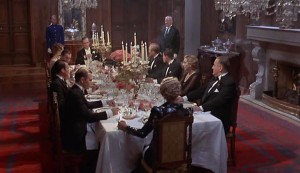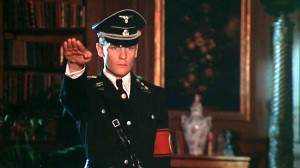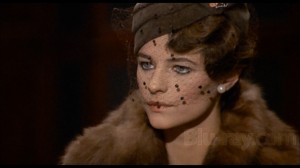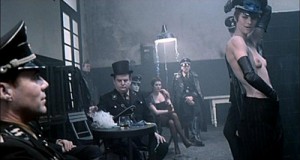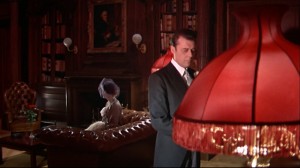(Italian title: La Caduta Degli Dei)
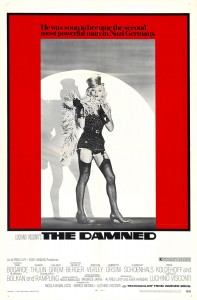 The German title of Luchino Visconti’s film, “Gotterdammerung,” after Wagner’s opera, may say it all. The Damned is the most savagely subversive film that Visconti had directed.
The German title of Luchino Visconti’s film, “Gotterdammerung,” after Wagner’s opera, may say it all. The Damned is the most savagely subversive film that Visconti had directed.
The Damned is a lavish melodramatic tale of decadence and corruption, drawing parallels between the decline and demise of a rich family of industrialists and the rise of Hitler and Nazism.
A major international hit, The Damned played for a long time in the American arthouse circuit and later on was a staple at universities’ film societies.
Visconti’s earlier, more modest but just as powerful films had analyzed Italian society during the Risorgimneto and the postwar periods, such as the 1960 Rocco and His Brothers.
The Damned has often been regarded as the first of Visconti’s “The German Trilogy,” a feature followed by Death in Venice (1971) and Ludwig (1973).
Like Visconti’s “The Leopard,” this epic tale, which is set in 1933-34, begins with an elaborate spectacle, in this case, a dinner that celebrates the retirement of the family’s patriarch, Baron Joachim von Essenbeck, the head of a huge steel empire. (The clan’s name is a thinly veiled reference to the Essen-based Krupp family of steel industrialists).
The older man has appointed Friedrich Bruckmann (Dirk Bogarde), an outsider, as the enterprise’s temporary chair.
The gathering takes a turn to the strange and the deviant, when Joachim’s grandson, Martin (Helmut Berger, at his most deviously handsome) dresses in drag and delivers one of Marlene Dietrich’s signature songs, “Falling in Love Again.”
The epitome of decadence, Martin is a sadistic bisexual, a drug addict, a pedophile, and also a rapist. One of the film’s most sensationalistic scene depicts the incestuous relationship between Martin and his mother Sophie (Ingrid Thulin), who’s Friedrich’s mistress. The other describes an orgy among the SA, who are then brutally killed by Hitler’s SS troops.
In the background, the Weimar Republic and German democracy come to an abrupt end with the burning of the Reichstag.
Sumptuously mounted, showing Visconti at its most operatic, “The Damned” is directed as a grand spectacle, defined by baroque sets and lavish costumes, which delibertely call attention to the excessively devious nature of the tale.
Detailed Plot
The Essenbecks, the clan at the center of the narrative, is a wealthy industrialist family doing business with the Nazis. On the night of the Reichstag’s fire , the family’s conservative patriarch, Baron Joachim von Essenbeck, who represents the old aristocratic Germany and is against Hitler, is murdered. Herbert Thalmann, the firm’s vice-president who openly opposes the Nazis, is framed for the crime. He escapes, but his wife Elizabeth and their children do not. The business is put under the control of a relative, SA officer Konstantin.
While his son, Günther, is a sensitive and troubled student, his nephew, Martin, is a sexually deviant playboy who is molesting his young cousin as well as a poor Jewish girl. Martin is dominated by his possessive mother, Sophie, the widow of Baron Joachim’s only son, a WWI hero. Martin’s drag performance as Marlene Dietrich in The Blue Angel at his grandfather’s birthday celebration, sends waves of shock to his audience—his relatives as well as the viewers.
Friedrich Bruckmann, an employee of the family firm and Sophie’s lover, ascends in power despite his low social status, thanks to Sophie’s support and the SS officer and family relation Aschenbach, who pits family factions against each other in order to move their steel and munition works into state control.
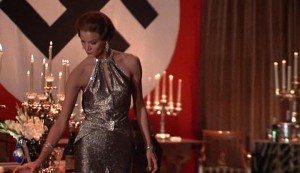 riedrich kills Konstantin in the SS coup against the SA (the populist fascist front) during its 1934 meeting. Known in history as the Night of the Long Knives, the SA meeting and the subsequent executions of its leaders by the SS is portrayed as a homosexual orgy and gory bloody massacre.
riedrich kills Konstantin in the SS coup against the SA (the populist fascist front) during its 1934 meeting. Known in history as the Night of the Long Knives, the SA meeting and the subsequent executions of its leaders by the SS is portrayed as a homosexual orgy and gory bloody massacre.
Aschenbach dismisses Friedrich, who controls the family fortunes, as a weakling and not a loyal Nazi. When Herbert Thalmann returns to the family table, he reveals that his wife and children were sent to Dachau concentration camp, where his wife died; he decides hand himself over to the Gestapo in return for the freedom of his children.
Aschenbach makes a deal with Martin, the ignored heir, to remove Friedrich and Sophie from control, so that Martin may get what is owed him. In the film’s most shocking act, Martin rapes his mother, who descends into catatonic madness, and allows Friedrich to marry her. The tale ends with Martin handing them poison for their suicide.
Critical Status
Opening to great worldwide acclaim, the film received an Oscar nomination for Best Screenplay.
It was named Best Foreign Film by the National Board of Review (NBR).
I have shown the film in various contexts, and it has always evoked strong response, ranging from disapproval and condemnation of its excessive theatricality and self-indulgence to appreciation and admiration for Visconti’s masterful treatment of the technical elements. As noted, the lavish production values include cinematography and musical score from Maurice Jarre.
Censorship
Shot in Italy and Germany, the film was given an “X” rating by the MPAA and was heavily edited whenever shown TV. In 2004, when Warner resubmitted the film for re-classification for its DVD release, the MPAA changed its rating “X” to “R.”
Oscar Nominations: 1
Story and Screenplay (Adapted): Nicola Badalucco, Enrico Medioli, Luchino Visconti
Oscar Awards: None
Oscar Context:
The Best Adapted Screenplay Oscar went to William Goldman for the Western, Butch Cassidy and the Sundance Kid.
Cast
Dirk Bogarde as Friedrich Bruckmann
Ingrid Thulin as Sophie von Essenbeck
Helmut Griem as Aschenbach
Helmut Berger as Martin von Essenbeck
Renaud Verley as Günther von Essenbeck
Umberto Orsini as Herbert Thallman
Reinhard Kolldehoff as Konstantin von Essenbeck
Albrecht Schoenhals as Joachim von Essenbeck
Florinda Bolkan as Olga
Nora Ricci as the Governess
Charlotte Rampling as Elizabeth Thalmann
Running Time: 155 Minutes
